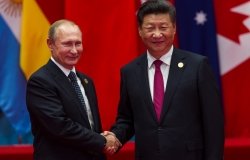Point of View: China's Leadership Transition
Gang Lin, program associate with the Center's Asia Program, discusses the regime change in China and its implications.
The world’s most populous nation has a new leader, Hu Jintao. His arrival as Communist Party general secretary, which occurred last month at the Party’s 16th National Congress, was the first power transfer in the history of the People’s Republic of China (PRC) that was unprompted by death or political crisis. But, beneath the scenes, the leadership transition is far from sharp or complete.
Former leader Jiang Zemin will retain considerable political influence beyond the formal transfer of the PRC presidency in spring 2003. First, Jiang’s seminal idea of the “three represents” has been enshrined in the party constitution. (The “three represents” call on the party to keep in tune with China’s rapidly changing society by representing advanced social forces such as private entrepreneurs, modern scientific culture, and the interests of the public).
Second, Jiang’s protégés have taken strategic posts within the Standing Committee of the Politburo, the Party’s highest policymaking organ. Third, Jiang may still utter his strong voice on critical policy issues through formal and informal channels. In the absence of a clear-cut power transfer from Jiang to Hu, outsiders should not expect any abrupt policy reorientation in the immediate future.
The new leadership apparently seeks to develop “inner-party democracy” through new ideas and institutions, without overhauling the existing one-party system. Measures under consideration are: A) making party committees of all levels more effective, by implementing collective leadership and majority rule among committee members, B) expanding the power base of the party elite by strengthening the Party Congress, C) developing check-and-balance mechanisms within the party, and D) increasing inner-party electoral competition.
However, can the party reach these goals without democratizing the whole society? Even if the new measures make the party leadership more responsible to its members, they do not render it accountable to society as a whole. In the absence of meaningful restraints on the party’s monopoly of power and the consequent blurring of lines between party and state authority, China’s political development is likely to be gradual, fraught with theoretical inconsistency and strategic ambiguity.
Related Program

Indo-Pacific Program
The Indo-Pacific Program promotes policy debate and intellectual discussions on US interests in the Asia-Pacific as well as political, economic, security, and social issues relating to the world’s most populous and economically dynamic region. Read more










